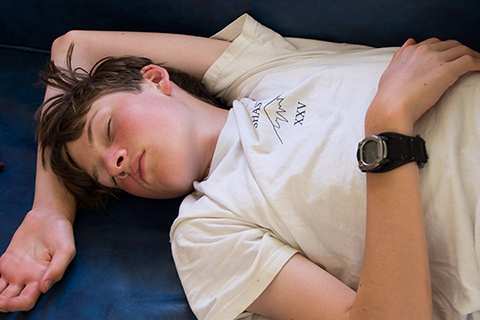Does a Teen's Bedtime Really Matter?
 An earlier bedtime may help teenagers by improving executive functioning abilities like memory, self-control, and problem solving, according to preliminary Northwestern University research.
An earlier bedtime may help teenagers by improving executive functioning abilities like memory, self-control, and problem solving, according to preliminary Northwestern University research.
Mounting evidence suggests that a lack of sleep can affect how youth perform academically, as well as their mental and physical health.
The Northwestern researchers, led by School of Education and Social Policy doctoral student Jacquelyn Stephens, wondered whether there was also a relationship between teens’ bedtime and critical cognitive abilities, specifically questioning whether an earlier bedtime would be associated with executive functioning.
The researchers asked 65 Chicago-area teenagers to measure the quality and quantity of their sleep for four nights by wearing research-grade sleep watches.
The volunteers rated several aspects of executive functioning, including the ability to complete tasks, organization and emotional control using a tool called the Behavior Rating Inventory of Executive Function, which assesses impaired executive function in children.
They found teenagers went to bed around 11 p.m. and averaged 6.5 hours of sleep per night. Those who reported later bedtimes demonstrated significantly lower overall executive functioning ability. Moreover, the researchers found some aspects of executive functioning were more sensitive to sleep than others.
Memory, planning, self-control, the ability to complete long term projects, and a shifting cognitive focus – such as getting upset by a change of plans – had the strongest relationships with bedtime, the researchers wrote in an article published by The Society for Community Research and Action (SCRA), a branch of the American Psychological Association.
The findings remained consistent when accounting for age, race, gender, the number of hours slept per
“Getting enough sleep is important for mood, physical functioning, and the brain’s ability to function, despite differences in these demographic, psychological, and sleep characteristics,” Stephens said. “Our study shows that an earlier bedtime, over and above the total number of hours slept, is important for teens’ cognitive functioning.”
Future research should examine the impact of sleep on academic and cognitive outcomes, the researchers said, noting their finds were correlational, not causal. “Yet our findings point to an important preliminary relationship between bedtime and executive functioning abilities for teenagers,” they wrote.
In addition to Stephens, the study was co-authored by Northwestern’s Rachael Ellison, a postdoctoral fellow; Ednah Nwafor, research coordinator; and Emma Adam, professor of human development and social policy. The research was carried out in Adam’s Contexts of Adolescent Stress and Thriving (COAST) lab and first presented at the Association for Psychological Science conference in San Francisco, Calif.